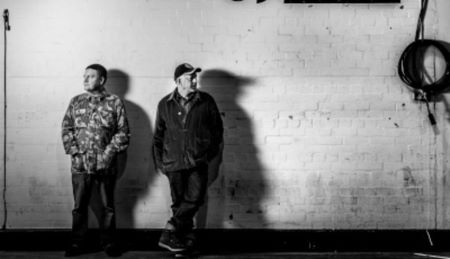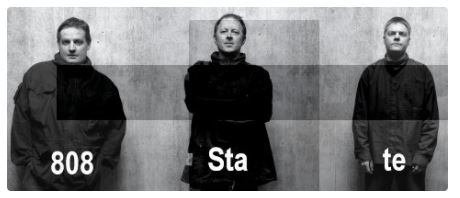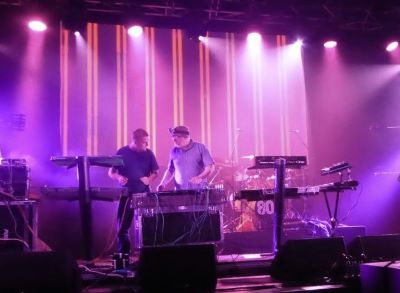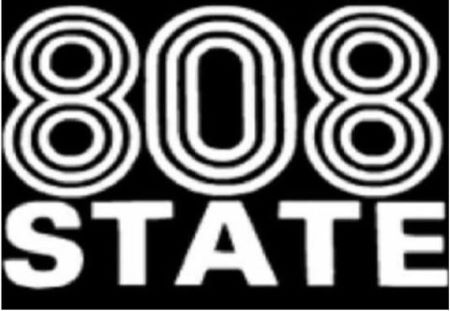|
Review
The Mancunian pioneers of Acid House, and electronic dance music more
widely, didn’t fail to impress as they brought a captivated crowd
on a journey looking to the past and to the future. A mixture of old
timer ravers reminded of the music of their youth and a younger generation
exploring the sonic variety of 808 State were brought together at The
Trinity Centre in Bristol. Andrew Barker couldn’t make it on the
night so the line-up consisted of founding member Graham Massey using
(and using well) an impressive range of instruments throughout the show,
impeccable accuracy from Carl Shorrocks on the live drums, dancing around
the programmed drums with apparent ease, and in place of Andrew was
Graham’s son on the programmed drums.
The set opened with the classic ‘In Yer Face’ which most people
of my generation are more likely to recognise as the song remixed by
Bicep although the original was a top 10 hit when it came out. The first
half of the gig remained not too far away from the pioneering acid house
that brought the group to fame, complete with mesmerizing laser show,
and Graham hopping between keys, saxophone, and guitar effortlessly.
The show picked up pace towards the end with a deeper and dirtier feeling
to the bass still kept the futuristic, spacey synths that have come
to define much of the group’s work. After an intense climax that
must have been around 170bpm the show ended to calls of an encore and
808 gladly accepted. They closed with their latest release, a remix
of Eve by Trance Wax, full of airy pads, soft pianos, acid house drums,
and a trancey synth riding over it all.
------

A few days after the show I had a chat with Graham on zoom a and
got the chance to delve a little deeper into hiss “jazz-informed
informed punk attitude”, bits and pieces on current events, and
of course, Manchester.
Interview with Graham Massey
What were you listening to when you were growing up and getting
into music?
I was born in 1960 and had two older brothers who were buying The Rolling
Stones, The Beatles and when you went to the cinema they used to play
The Shadows in the interval. The cinema had bass and it was really spell
binding for me to hear that because your domestic record player didn’t
have any. I also remember being in a cafe my dad which had a jukebox
with really good bass playing Telstar by The tornadoes. There was all
this space-age, glamorous instrumentals that went in early and some
of that carries into 808 in its melodic sense. Growing up in the 60s
and all the space race stuff was an early input and I was really into
the space thing. I was a keen amateur astronomer so not just the rockets
but looking out. We all though were gonna be living on different planets
back then.
Electronic music like the Human League and Cabaret Voltaire became affordable
and there was a “this is how you use synthesizers” thing going
on. I saw the Human league in about 78 and they had a slideshow showing
science fiction visuals. The first group I was really into was Hawkwind,
another space facing band with a lot of noise and synthesisers, and
they had a great lightshow. The first group I was in was a space rock
band, around the same time as punk. I’ve never had a music lesson
but when we were doing post-punk back then it didn’t matter, it
was about having a go. If there was a wind instrument you’d just
have a go. That’s how the sax playing came about. I’d been
playing clarinet and bits of sax in my band The Biting Tongues. The
main sax player left his sax behind that evening and if he hadn’t
the sax playing wouldn’t have been on that record. There was a
band we played a few gigs with called Rip, Rig & Panic from Bristol
and they had a similar vibe, a jazz informed punk attitude. I’ve
learned to make music with noise and to make music fearlessly. It’s
the attitude that’s more important.
When rave came along, and I got interested in studio craft, I did an
engineering course in the mid 80. Atari computers then came about at
the same time with samplers and samplers to me were such an open door
to what I’d already been doing which was messing with noise. Synthesisers
were prohibitively expensive when they first came out but once you got
all this midi stuff like DX7s people were giving it away.

What was Manchester like and how is it changing?
Manchester had an emerging club scene where various people from disparate
clubs came together in a place like The Haçienda. It was a melting
pot where social barriers came down, sexual barriers came down, and
it was kind of a first true reflection of our city. A lot of the raves
around Manchester were in places like Blackburn and Rochdale, a surrounding
circle of smaller towns that were probably a little more damaged than
Manchester.
Manchester is going through a great change at the moment with the city
centre living thing. There’s a lot of property development and
not a lot of social housing. It’s all for profit and the money
comes from all over, places like China, Russia, and the Middle East
and it’s taking on a London like quality. I wonder how that will
affect the culture of a place like Manchester which has one of the most
astounding musical legacies on Earth! There’s diverse and original
music that’s come from our city and I wonder whether that can continue
when a city operates in a different way. I don’t want it to become
a museum. You see what’s gone on in Liverpool where it’s about
The Beatles and there’s a certain amount of that with The Haçienda.
That period of music has become really polarised and about certain figureheads
and it’s unusual when you see Bez on Master Chef and Dancing on
Ice and that kind of thing. You do get a polarisation where The Happy
Mondays seem way more important than they were, I mean they were important
at the time but I’m not sure they were that important. The Stone
Roses were similar, the west-coast guitar/bass thing didn’t fit
in with what we were doing in the clubs and they had to bend their sound
to fit in, The Happy Mondays did as well. Luckily for us we’d spent
a lot of time bending other people’s records into clubs. Sometimes
I feel that 808 has been written out of that Manchester history a little
bit too much. I feel like we were doing the music that truly reflected
the mood and forward-thinking nature of that revolution which was Acid
House. We didn’t have that frontman quality, we were faceless,
but the whole scene was about being faceless. The division between the
audience and crowd was deliberately blurred and it was easy to get lost
in the fog.
How has the relationship between the DJ and the crowd changed?
The DJ has a lot of power now. Back then the music was much more mixed
and was about manipulating the journey of the night. You expect everything
to be genre-based now and there’s less dynamics. People are curating
nights as well and I can understand that, you want somebody to maker
those choices rather than it be based on some hot record at the time.
You get some interesting line-ups but it’s almost like the audience
doesn’t put much importance on artists, there’s so many records
and there’s no stories and no personalities around the records.
Who was the drummer?
Carl Shorrocks was the drummer and he’s usually with us but we’ve
had a series of drummers over the past 20-odd years and half way through
the tour we switched drummers. I love drummers and the energy they give
to a show. Carl’s amazingly accurate as well in how he plays to
the groove. The rhythms are complex and layered in 808 and we think
about the role that doesn’t obscure the all the programmed drums.

What’s next for music and are there any new artists you have
your eye on?
I think there’s a schism in the way music is delivered now. In
certain ways you have a feeling that the traditional music industry
is dying off. When we first signed to ZTT records in 1989 we’d
come from an underground situation. We had our own record shop, our
own radio show, our own t-shirt. We were in a good position to be independent
yet there was such a shift in music that we fastened ourselves to Warner
Brothers to enter public life. That sort of thing changed the roots
of electronic dance music I think. In the streaming world you’re
either a Bandcamp cottage industry kind of thing or more towards record
companies that will only invest in certain kinds of acts. Then you’ve
got the main dance record companies like Mute and Warp somewhere in
the middle. It’s weakening though I think.
All these things were born of a certain moment. The next thing will
come from the underground. There’s just so much music out there,
Bandcamp constantly throws up music in a live feed and it can be completely
overwhelming. I follow things through friends and we share tips, word
of mouth. You need people you can trust to guide you through. When we
started there was someone like John Peel on Radio 1 and if you got on
that he was playing to the entire country. It was almost like a given
if you’d just done a record you could get it on that show and you
didn’t doubt it which meant there was an optimism in what you were
doing.
When we were growing up in Manchester and the only people we could play
to were a handful of clubs in the centre and you knew that the music
business was this little circle of events and the water was inviting.
People didn’t keep you out. You were rubbing shoulders with people
like Joy Division in a comparative way. That’s what it needs, these
little scenes from the ground up. I feel that when I’m in Manchester
or Leeds and a set of acts get grouped together and support each other
regularly. It’s about making community. A musical community. I
don’t know whether I read it slightly differently because of my
age but when we had the studio in the Granada complex for our last record,
that was like a little village. There were a lot of studios and creative
projects and we’d all bump into each other. Our recent GoGoPenguin
remix came out of that. Their drummer is obsessed with Aphex Twin and
it’s almost like electronica done acoustically. They were recoding
in our building and get interested in our synths and consequently they’ve
done a remix album called RMX and it’s got people like Cornelius,
Squarepusher and Shunya. I really like what Shunya’s been doing,
and I got in touch with him about my project Tool Shed which is about
live improvising.
It’s been weird with the pandemic. It’s put a buffer on the
communal interaction between bands and that and it might take a while
to get over. Sometimes I go into the city centre and it all seems a
bit singer-songwritery at the moment.
What did you think of the crowd at your Bristol gig?
In the gigs we’ve done recently we’ve noticed that age group
of the audience has kind of been filtered. The slightly older people
are perhaps a bit more cautious and don’t go out and it means the
audience to us seems a lot younger this time round. That’s a different
energy and that’s great for us because the music should work without
the history. We always like playing things like festivals where we can
win a new set of people. It feels sporting to us to play to the unfamiliar
and see if it still works.

If you could come to Boris Johnson in a dream, what would you say?
It’s really weird having him in the city at the moment cos the
conference is on at the moment. The protest isn’t particularly
reported even though it’s traditionally a massive gathering every
time the conference is up. It feels like you’re going up the motorway
on a national express coach and the driver is the Joker. It just feels
out of control. I’ve never known anything like it, and we grew
up through Thatcher. Obviously, some if it’s the pandemic but can
you think of a worse person to have during a pandemic?
Chips or Cream Buns?
Can I choose both?
I don’t think you can
Chips then.
Ewan Frolich
Massive thanks to Graham and to Rob at Sonic PR for
their time and help
|





